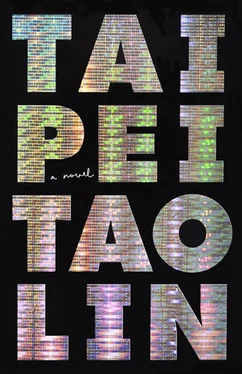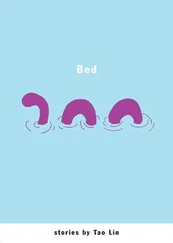As the bus moved into denser parts of Taipei, nearing Paul’s parents’ apartment building, Paul felt like he could almost sense the computerization that was happening in this area of the universe, on Earth — could imagine the three- or four-minute simulation, in a documentary that probably existed, of occurrence and eventual, omnidirectional expansion, converting asteroids and rays and stars, then galaxies and clusters of galaxies, as they became elapsed in space, into more of itself. Paul had read about this in high school, lying on the carpet in his room, in The End of Science, with excitement, intuiting that, from the perspective of the computer at the end of everything, which he would be a part of and which would synthetically resemble an undifferentiated oneness, it didn’t matter if he had never kissed a girl, was too anxious to communicate with his peers, had no friends, etc. When Erin woke, seeming depressed and confused, avoiding looking at anything as she sat up, Paul patted his lap and she lay there again. Paul asked if she could think of a newer word for “computer” than “computer,” which seemed outdated and, in still being used, suspicious in some way, like maybe the word itself was intelligent and had manipulated culture in its favor, perpetuating its usage.
“I’m still thinking,” she said after a few minutes.
“I don’t think my question made sense,” said Paul. “There can’t be a newer word. . for the same word.”
• • •
More framed pictures of Paul were on display in his room, it seemed, than last year. Seeing them (two as a baby, four as a small child, one as an adolescent, two as a teenager in his marching band uniform) arranged on shelves, in two corners, Paul imagined his mother placing them strategically to affect him to use less drugs. He gathered all but one (in which he was nine or ten and grinning and holding, for some reason, a Three Musketeers — style sword, with his parents and brother, in a professional studio in Taipei, with an outer-space-themed background, unfurled like a scroll, he vaguely remembered, on the wall, pre — green screen) and stacked them — so many the room had felt like a memorial — facedown on a dresser, saying they made him uncomfortable. Erin asked why and said he looked cute and happy in them. Paul said he would feel uncomfortable seeing that many of anyone’s face.
The next afternoon, walking to a street market, Paul and Erin stopped to look at a two-story McDonald’s with five employees outside speaking into megaphones, sometimes in unison, waving banners and flags. Paul said there were fewer McDonald’s in Taiwan than fifteen years ago, that this was probably a “last-ditch effort,” which seemed to be working (the first floor — they could see through the glass front — was entirely filled with customers). Erin said they should improvise a documentary titled Taiwan’s Last McDonald’s or Taiwan’s First McDonald’s . They walked to the end of the street market and back, on the same route, buying and eating things, then bought and ate egg tarts from two different bakeries, then with nervous grins earnestly discussed eating however many egg tarts it would take for them to not want more, but resisted and returned to the apartment building, where they lay for an hour in the building’s sauna and dog-paddled, in a heated pool, to six different massage stations, including one — partly simulating a waterfall, maybe — where water fell eight to ten feet in pummeling, faucet-like columns onto the tops of their heads.
• • •
“My face won’t stop being red from the thing,” said Erin, an hour later, in Paul’s room, in a voice like she was mostly thinking about something else. Paul was trying to open the taped CD case for Nirvana’s second “greatest hits” collection. He looked at Erin briefly. “It looks good,” he mumbled looking at the CD case. His mother, in the hallway outside the room, whose door was open a few inches, said something in Mandarin.
“What?” said Paul in Mandarin.
“Bring your phone,” said Paul’s mother in Mandarin.
“Okay.”
“What?”
“Okay,” said Paul in Mandarin. “Don’t worry,” he said in Mandarin in a louder, agitated-sounding voice.
“Okay. Your father and I are going to eat.”
“Okay,” said Paul in Mandarin.
“Do you. . want to come eat together?”
“No,” said Paul in Mandarin.
“They’re leaving,” said Paul after a few seconds.
“Oh,” said Erin in a staccato with a worried expression.
“We’ll wait till they leave.”
“Oh,” said Erin.
“Before we—” said Paul.
Erin nodded attentively.
“They’re going to eat,” said Paul, and walked to a bookshelf and stared at two hardbound Animal Life volumes with the same image of a cheetah climbing a tree on their spines. He opened and closed a drawer, aware he wasn’t thinking anything, then put on black socks and hugged Erin from behind. They looked at themselves, being recorded, on the screen — uniquely neither reflection nor movie, but viewable perspective — of Paul’s MacBook, smiling sarcastically. Their plan for tonight was to ingest MDMA, after Paul’s parents left, and go to a shopping district where the streets, closed off to cars, were used as giant sidewalks. Paul showed Erin its Wikipedia page (“Ximending is the source of Taiwan’s fashion, subculture, and Japanese culture) and typed “ximending” in Google Images.
“Whoa,” said Erin. “Looks like Times Square.”
“We’re leaving,” shouted Paul’s mother a few minutes later, when Paul and Erin were looking at the Wikipedia page for 28 Days Later, which Erin had said was one of her favorite movies. Paul was rereading a sentence (“As he gets hit by a car in his flashback, he simultaneously dies on the operating table”) for the fourth time, in idle confusion, when the apartment’s metal door closed in a loud and distinct but, Paul thought, non-ominous click.
Ten minutes later Paul was at the dining table staring at an email from Calvin (“hi bro. did you get the steaks my dad sent you? lol. .”) while waiting for Erin, who was in the bathroom. Paul typed “hi” and his eyes unfocused. He typed “,” and saved “hi,” as a draft. He minimized Safari and saw his face, which seemed bored and depressed, his default expression. He maximized Safari and imagined millions of windows, positioned to appear like one window. He closed his eyes and thought of the backs of his eyelids as computer screens; both could display anything imaginable, so had infinite depth, but as physical surfaces were nearly depthless. Paul typed “ppl are powerful computers w 2 computer screens & free/fast/reliable access to their own internet” in Twitter, copied it, closed Twitter, pasted it in his Gmail draft of tweet drafts. He was thinking about the fast-food restaurant Arby’s, which he’d always felt a little confused by, when Erin appeared behind him and patted his shoulders with both hands moving up and down.
“Let’s hug as hard as we can,” said Paul, and stood and they did. “I think being squished really hard is what people who cut themselves get. . to feel.”
“Have you cut yourself?”
“No. Have you?”
“No,” said Erin carrying the MacBook toward the front door.
“Why would being squished feel good?” said Paul absently.
“Hm,” said Erin. “Do you have m—”
“Raarrr!” screamed Paul with his mouth open.
“Jesus,” said Erin grinning.
“Does it smell?” said Paul about his breath.
“Maybe like coffee a little bit. But it’s okay.”
Paul jogged to the bathroom, brushed his teeth and tongue, rinsed his mouth, jogged to the front door. Erin asked if he had her “ID thing”—he did — then touched his arm and quickly said “do you feel okay?” in a high-pitched voice. Paul, who’d begun to feel the MDMA, looked at Erin’s hand and imagined feeling utter disbelief, increasing to uncontrollable rage, that she would touch his arm, at a time like this. “Yeah,” he said with a neutral expression. “Do you?”
Читать дальше












